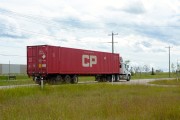By Clare Demerse and Matthew Bramley
With an election to replace George W. Bush just days away, Washington seems ready to wake up from its long slumber on global warming. That gives Canada an important choice: do we want to lead the parade - or fall meekly into line behind our neighbours to the south?
Stephen Harper's election platform hinted at this new reality. It began by promising the status quo: to implement the government's "Turning the Corner" proposal for greenhouse gas regulations starting in 2010. But in the next breath, the platform acknowledged the new kid in town by pledging to "develop and implement a North America-wide cap and trade system for greenhouse gases" by 2012-2015.
There's a big problem with that: Canada's current proposal is incompatible with the direction the U.S. is taking.
Stephen Harper's plan uses "intensity" targets for industry, an approach that allows pollution to grow as firms increase their production. The federal government projects that its targets would allow emissions from Alberta's oilsands to nearly triple between 2006 and 2017.
In the U.S., intensity targets are not on the table; they're seen as a vestige of the Bush administration's failed approach. Both Barack Obama and John McCain have pledged a cap-and-trade system that puts hard caps on pollution.
There's more: the Canadian proposal would give companies a bewildering range of options to meet their targets, from technology funds to offset credits and special "pre-certified" credits. We don't know yet what the U.S. approach will look like, but it's safe to say that Canada's convoluted, loophole-ridden proposal will not come close to aligning with any bill the next president will sign into law.
So unless things change, the Canadian government's strategy is to put one plan into effect in 2010, and then switch to a very different "North American" approach as little as two years later. That switchover would be very tricky to administer; worse, it risks moving Canada from bad to worse environmentally.
Every independent analyst to review Mr. Harper's Turning the Corner plan has concluded that it's too weak to meet its own targets. Implementing that plan only to move soon afterwards to a U.S.-led system is a prescription for even more years of climate policy uncertainty and delay. That's the last thing we need at a time when businesses are craving stability - and when climate scientists tell us that we have simply no time left to waste on inaction.
Faced with this prospect, Stephen Harper has a couple of options. One is to further delay and eventually abandon his Turning the Corner plan, arguing that there's no point in Canada pursuing a different path than the U.S.
Or Mr. Harper could lead. That means strengthening his proposal now, by dropping the obsolete idea of intensity targets and replacing them with stronger absolute targets. And it means drastically simplify his plan by cutting out the loopholes.
The election we just concluded gives Prime Minister Harper the space to make a fresh start. If Canada can have strong greenhouse gas regulations up and running quickly - and a success story to tell - we'll be in a position to shape U.S. policy instead of being led by Washington.
Officials in Ottawa have spent the past decade designing regulations and collecting data to cut emissions. With all that expertise available, there's no doubt that Mr. Harper could put in place a strong Canadian cap-and-trade system by 2010 if he really wanted to.
Adopting a strong new proposal on climate change would seem like a dramatic turnaround for our current prime minister. But he has a track record of changing his mind when he thinks the circumstances warrant it.
And he's done an about-face already on global warming, in words if not yet in actions. Stephen Harper barely mentioned global warming in the 2006 election campaign, preferring to focus on conventional air pollution. But by June of 2007, he was calling climate change "perhaps the biggest threat to confront the future of humanity today."
Canada has all the ingenuity and technical expertise to confront that threat. Polls show that Canadians want their government to be a world leader in fighting global warming. The only missing ingredient is political leadership - which we shouldn't have to borrow from the United States.
To paraphrase Wayne Gretzky, this is our chance to go where the puck is going, not where it's been. And we need to do it before the ice melts.
Clare Demerse and Matthew Bramley's latest report is Choosing Greenhouse Gas Emission Reduction Policies in Canada.





